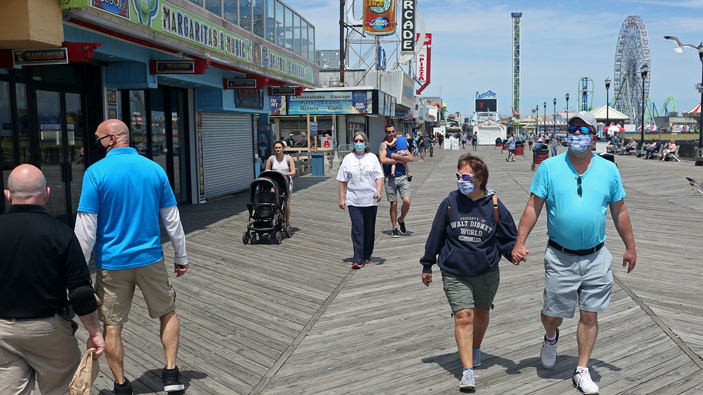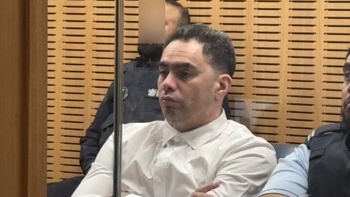Follow
the podcast on

In a few hours, Connecticut will allow residents to dine at a restaurant outdoors or go into a retail shop.
The state will be the final one of those that ordered people to stay home and most businesses to close up for a while to start to reopen.
Connecticut is taking "baby steps," Gov. Ned Lamont told CNN.
Also being allowed to reopen are offices, museums, zoos and outdoor recreation.
"We have followed the metrics, hospitalization is down, fatalities are down. We have a lot of (protective equipment) right now. We have the gowns and masks. And finally, we have the contact tracing in place," he said.
As of Wednesday, all states will be in some phase of reopening. The question is how many people will go out; are they ready to eat out and shop?
Pictures from some parts of the country are now reminiscent of pre-pandemic times, with Americans venturing out to parks to soak in the spring sunshine, visiting beaches and gathering -- often unmasked -- in open bars and restaurants.
Yet as of Tuesday, at least 17 states have recorded a clear upward trend of average new daily cases -- a rise of at least 10% -- over the past seven days, according to an analysis based on data from Johns Hopkins University.
Only 16 states' average new daily cases dropped more than 10%. Some public health experts say declining case rates should be one guide for figuring when states should relax social distancing restrictions.
So far, more than 1.52 million people in the United States have been infected and at least 91,878 have died, according to Johns Hopkins.
Just how loosened restrictions will impact coronavirus cases won't be evident for a while.
Experts have said it may take weeks to begin seeing the effects of more people being out and about. And public health officials warned those effects may translate to thousands more deaths across the country and a second spike of cases.
Reopenings appear to have the momentum for now, including, slowly, for sports without a crowd in attendance. The Belmont Stakes will be held June 20, officials said Tuesday. That means horse racing's Triple Crown will start with what traditionally is the third leg, because the Kentucky Derby and the Preakness Stakes were moved to later this year.
Steps that governments did take to shut parts of the economy to slow the virus led to soaring unemployment -- more than 36 million people have filed for unemployment since the middle of March.
In a Senate committee hearing Tuesday, Federal Reserve Chairman Jerome Powell said a program to lend billions of dollars to small and medium-sized businesses should be ready to launch by the end of the month.
Coronavirus: You asked, we answered
Some universities will have in-person classes but end them by Thanksgiving
A growing number of universities are rolling out plans for what fall semester will look like.
At least five said this week they will have in-person classes this fall -- but also that they'll skip fall break and stop those classes by Thanksgiving.
In general, these schools are hoping to minimize the number of mass exits and mass returns -- when students may pick up the virus elsewhere and bring it to campus.
The University of Notre Dame in Indiana and Creighton University in Nebraska said they intend to start their fall semesters early, skip fall break and conclude the semester before Thanksgiving.
The Rev. Daniel Hendrickson, president of Creighton University, told CNN's Brianna Keilar that he believes the school can provide a very safe environment and they want to finish the semester before an expected wave of flu hits.
"We anticipate a flu season and a cold season coming up in late November, early December. That'll be confusing for any of us to try and understand who's sick and what do they have," he said. "So trying to end this semester before that occurs, and in anticipation of the second wave of the pandemic, we want to get this semester started and ended on an earlier schedule."
The president of Notre Dame, the Rev. John Jenkins, told CNN that residential life is very important and they will have off-campus facilities in case students need to be isolated or quarantined. He also wants to be able to test many people on campus.
"We have three months before those students are here. We have to work hard in these months so we don't have it now, but we will come August," he said.
It is unrealistic to think they will have no confirmed cases, he added.
"I know 18- to 22-year-old young people. Whether they're on the campus or they are away, they're going to congregate and they're going put themselves at a bit of risk. Our challenge is keep monitoring them if they do get sick to make sure they're taken care of."
Purdue University in Indiana; Rice University in Houston; and the University of South Carolina intend to cancel fall breaks and end in-person instruction by Thanksgiving, and will finish the semester -- classes and/or exams -- online.
New York University said it will have some in-person classes and some online. Some classes might stretch into a second or third semester, NYU told students.
"The best information is that these viruses tend to return around the winter, particularly in possibly late November, December, maybe January. And so we wanted to be prepared for that," Rice President David Leebron said Tuesday.
These and other schools planning for in-person instruction generally have talked about plans for diagnostic testing for Covid-19, isolating ill students, and keeping students more apart than usual in classes.
"I think students are so excited and so grateful to hear that Rice is willing to do everything that they can to get students back on campus safely," Anna Margaret Clyburn, a rising senior and president of Rice's student body association, said Tuesday.
These schools' plans come a week after California's two main university systems indicated their students are unlikely to have on-campus classes this fall, because of the pandemic.
UVC light to be used on NYC subway cars
The Metropolitan Transportation Authority early next week plans to launch an ultraviolet light program, proven to kill Covid-19, on its subways, buses and other New York transit facilities -- in conjunction with a Denver-based startup, according to the agency.
The pilot program will use about 150 dual-headed mobile devices from PURO Lighting to test the efficiency and cost-effectiveness of UVC technology in a number of settings," a release from the MTA said.
The first phase will include subway cars, buses and facilities. The second phase will expand to include commuter rail cars.
The MTA touts UVC light as "an efficient, proven, and effective technology for eliminating viruses, including SARS-CoV-2 that causes Covid-19," and has been demonstrated to kill viruses in hospital operating rooms, urgent care clinics, universities and fire stations.
Ultraviolet light is part of the electromagnetic spectrum emitted by the sun. UVC rays are absorbed by the atmospheric ozone, but rays of UVA and UVB reach the Earth's surface. Both UVA and UVB are important to human health.
Two factors are required for ultraviolet light to destroy a virus: intensity and time. But if the light is intense enough to break apart a virus in a short time, it's going to be dangerous to people, Donald Milton of the University of Maryland told CNN last month.
"It has been used for quite a while in surface decontamination by bringing very bright lights into, say, the hospital room between patients to do a quick surface decontamination," Milton said. "But that means having lights so bright you can't have people in the room because it will hurt their eyes."
Take your Radio, Podcasts and Music with you









